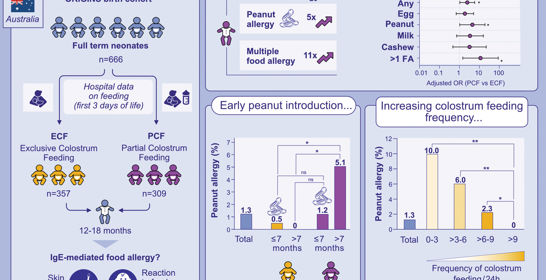
Don’t miss out on new resources
Please join us as we – together with our partners – chart new paths toward a healthier world. Sign up for our newsletter today.

Graphical abstract © 2025 Allergy published by European Academy of Allergy and Clinical Immunology and John Wiley & Sons Ltd.
M. Bhasin, M. Cooper, P. Macchiaverni, et al., “Colostrum as a Protective Factor Against Peanut Allergy: Evidence From a Birth Cohort,” Allergy (2025): 1–11, https://doi.org/10.1111/all.70043.
Infants who received colostrum exclusively at birth were 11 times less likely to develop multiple food allergies and five times less likely to develop peanut allergies than those who received formula supplements during their first days of life.
Remarkably, no cases of peanut allergy were observed among infants who received nine or more colostrum feedings per day, according to findings from a study of Australian infants aged 12–18 months, led by Professor Valerie Verhasselt, Director of the Larsson-Rosenquist Foundation Centre for Immunology and Breastfeeding, School of Medicine, University of Western Australia.
Colostrum, the breastmilk produced in the first three days of a newborn’s life, is often called ‘liquid gold’, a well-deserved name.
“Furthermore, promoting colostrum feeding may help ease some parents’ concerns about the safety and challenges of introducing peanut foods early in an infant’s diet. Among infants who received colostrum exclusively, the risk of developing peanut allergy was similar regardless of whether peanut was introduced early or later. This contrasts sharply with infants who received formula supplements at birth, whose risk was highest when peanut introduction was delayed,” writes study first author Maheshwar Bhasin, PhD candidate.
The study’s findings may encourage greater investment in supporting early breastfeeding and in research to develop appropriate supplements for infants who require them for medical reasons. They were recently published in the premier journal Allergy (‘Colostrum as a Protective Factor Against Peanut Allergy: Evidence From a Birth Cohort’: https://onlinelibrary.wiley.com/doi/10.1111/all.70043).
FLRF is a proud co-sponsor of this study.
Interested in other health and developmental news around breastmilk and breastfeeding? Sign up for our newsletter!